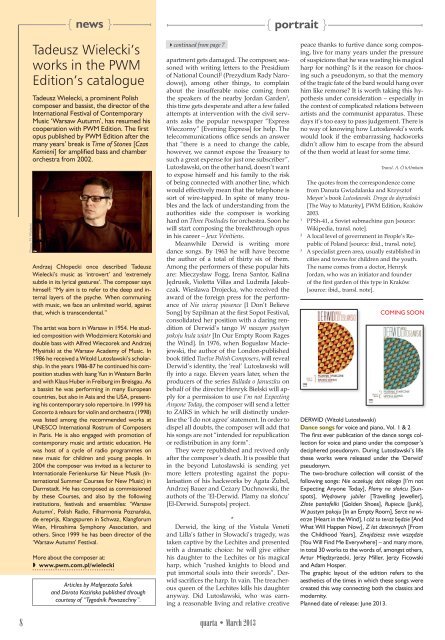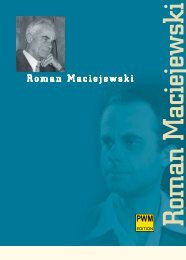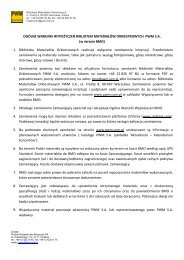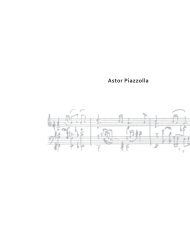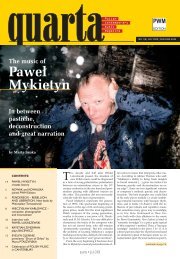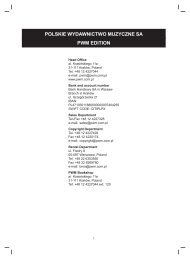On Paweł Łukaszewski's music
On Paweł Łukaszewski's music
On Paweł Łukaszewski's music
You also want an ePaper? Increase the reach of your titles
YUMPU automatically turns print PDFs into web optimized ePapers that Google loves.
{ news }<br />
{ portrait }<br />
Photo: M. Wielecki<br />
Tadeusz Wielecki’s<br />
works in the PWM<br />
Edition’s catalogue<br />
Tadeusz Wielecki, a prominent Polish<br />
composer and bassist, the director of the<br />
International Festival of Contemporary<br />
Music ‘Warsaw Autumn’, has resumed his<br />
cooperation with PWM Edition. The first<br />
opus published by PWM Edition after the<br />
many years’ break is Time of Stones [Czas<br />
Kamieni] for amplified bass and chamber<br />
orchestra from 2002.<br />
Andrzej Chłopecki once described Tadeusz<br />
Wielecki’s <strong>music</strong> as ‘introvert’ and ‘extremely<br />
subtle in its lyrical gestures’. The composer says<br />
himself: “My aim is to refer to the deep and internal<br />
layers of the psyche. When communing<br />
with <strong>music</strong>, we face an unlimited world, against<br />
that, which is transcendental.”<br />
The artist was born in Warsaw in 1954. He studied<br />
composition with Włodzimierz Kotoński and<br />
double bass with Alfred Wieczorek and Andrzej<br />
Młysiński at the Warsaw Academy of Music. In<br />
1986 he received a Witold Lutosławski’s scholarship.<br />
In the years 1986-87 he continued his composition<br />
studies with Isang Yun in Western Berlin<br />
and with Klaus Huber in Freiburg im Breisgau. As<br />
a bassist he was performing in many European<br />
countries, but also in Asia and the USA, presenting<br />
his contemporary solo repertoire. In 1999 his<br />
Concerto à rebours for violin and orchestra (1998)<br />
was listed among the recommended works at<br />
UNESCO International Rostrum of Composers<br />
in Paris. He is also engaged with promotion of<br />
contemporary <strong>music</strong> and artistic education. He<br />
was host of a cycle of radio programmes on<br />
new <strong>music</strong> for children and young people. In<br />
2004 the composer was invited as a lecturer to<br />
Internationale Ferienkurse für Neue Musik (International<br />
Summer Courses for New Music) in<br />
Darmstadt. He has composed as commissioned<br />
by these Courses, and also by the following<br />
institutions, festivals and ensembles: ‘Warsaw<br />
Autumn’, Polish Radio, Filharmonia Poznańska,<br />
de ereprijs, Klangspuren in Schwaz, Klangforum<br />
Wien, Hiroshima Symphony Association, and<br />
others. Since 1999 he has been director of the<br />
‘Warsaw Autumn’ Festival.<br />
More about the composer at:<br />
www.pwm.com.pl/wielecki<br />
Articles by Małgorzata Sułek<br />
and Dorota Kozińska published through<br />
courtesy of “Tygodnik Powszechny”.<br />
continued from page 7<br />
apartment gets damaged. The composer, seasoned<br />
with writing letters to the Presidium<br />
of National Council 2 (Prezydium Rady Narodowej),<br />
among other things, to complain<br />
about the insufferable noise coming from<br />
the speakers of the nearby Jordan Garden 3 ,<br />
this time gets desperate and after a few failed<br />
attempts at intervention with the civil servants<br />
asks the popular newspaper “Express<br />
Wieczorny” [Evening Express] for help. The<br />
telecommunications office sends an answer<br />
that “there is a need to change the cable,<br />
however, we cannot expose the Treasury to<br />
such a great expense for just one subscriber”.<br />
Lutosławski, on the other hand, doesn’t want<br />
to expose himself and his family to the risk<br />
of being connected with another line, which<br />
would effectively mean that the telephone is<br />
sort of wire-tapped. In spite of many troubles<br />
and the lack of understanding from the<br />
authorities side the composer is working<br />
hard on Three Postludes for orchestra. Soon he<br />
will start composing the breakthrough opus<br />
in his career – Jeux Vénitiens.<br />
Meanwhile Derwid is writing more<br />
dance songs. By 1963 he will have become<br />
the author of a total of thirty six of them.<br />
Among the performers of these popular hits<br />
are: Mieczysław Fogg, Irena Santor, Kalina<br />
Jędrusik, Violetta Villas and Ludmiła Jakubczak.<br />
Wiesława Drojecka, who received the<br />
award of the foreign press for the performance<br />
of Nie wierzę piosence [I Don’t Believe<br />
Song] by Szpilman at the first Sopot Festival,<br />
consolidated her position with a daring rendition<br />
of Derwid’s tango W naszym pustym<br />
pokoju hula wiatr [In Our Empty Room Rages<br />
the Wind]. In 1976, when Bogusław Maciejewski,<br />
the author of the London-published<br />
book titled Twelve Polish Composers, will reveal<br />
Derwid’s identity, the ‘real’ Lutosławski will<br />
fly into a rage. Eleven years later, when the<br />
producers of the series Ballada o Januszku on<br />
behalf of the director Henryk Bielski will apply<br />
for a permission to use I’m not Expecting<br />
Anyone Today, the composer will send a letter<br />
to ZAIKS in which he will distinctly underline<br />
the ‘I do not agree’ statement. In order to<br />
dispel all doubts, the composer will add that<br />
his songs are not “intended for republication<br />
or redistribution in any form”.<br />
They were republished and revived only<br />
after the composer’s death. It is possible that<br />
in the beyond Lutosławski is sending yet<br />
more letters protesting against the popularisation<br />
of his hackworks by Agata Zubel,<br />
Andrzej Bauer and Cezary Duchnowski, the<br />
authots of the ‘El-Derwid. Plamy na słońcu’<br />
[El-Derwid. Sunspots] project.<br />
*<br />
Derwid, the king of the Vistula Veneti<br />
and Lilla’s father in Słowacki’s tragedy, was<br />
taken captive by the Lechites and presented<br />
with a dramatic choice: he will give either<br />
his daughter to the Lechites or his magical<br />
harp, which “rushed knights to blood and<br />
put immortal souls into their swords”. Derwid<br />
sacrifices the harp. In vain. The treacherous<br />
queen of the Lechites kills his daughter<br />
anyway. Did Lutosławski, who was earning<br />
a reasonable living and relative creative<br />
peace thanks to furtive dance song composing,<br />
live for many years under the pressure<br />
of suspicions that he was wasting his magical<br />
harp for nothing? Is it the reason for choosing<br />
such a pseudonym, so that the memory<br />
of the tragic fate of the bard would hang over<br />
him like remorse? It is worth taking this hypothesis<br />
under consideration – especially in<br />
the context of complicated relations between<br />
artists and the communist apparatus. These<br />
days it’s too easy to pass judgement. There is<br />
no way of knowing how Lutosławski’s work<br />
would look if the embarrassing hackworks<br />
didn’t allow him to escape from the absurd<br />
of the then world at least for some time.<br />
Transl. A. Ó hAlmhain<br />
The quotes from the correspondence come<br />
from Danuta Gwizdalanka and Krzysztof<br />
Meyer’s book Lutosławski. Droga do dojrzałości<br />
[The Way to Maturity], PWM Edition, Kraków<br />
2003.<br />
1<br />
PPSh-41, a Soviet submachine gun [source:<br />
Wikipedia, transl. note].<br />
2<br />
A local level of government in People’s Republic<br />
of Poland [source: ibid., transl. note].<br />
3<br />
A specialist green area, usually established in<br />
cities and towns for children and the youth.<br />
The name comes from a doctor, Henryk<br />
Jordan, who was an initiator and founder<br />
of the first garden of this type in Kraków<br />
[source: ibid., transl. note].<br />
COMING SOON<br />
DERWID (Witold Lutosławski)<br />
Dance songs for voice and piano, Vol. 1 & 2<br />
The fi rst ever publication of the dance songs collection<br />
for voice and piano under the composer’s<br />
deciphered pseudonym. During Lutosławski’s life<br />
these works were released under the ‘Derwid’<br />
pseudonym.<br />
The two-brochure collection will consist of the<br />
following songs: Nie oczekuję dziś nikogo [I’m not<br />
Expecting Anyone Today], Plamy na słońcu [Sunspots],<br />
Wędrowny jubiler [Travelling Jeweller],<br />
Złote pantofelki [Golden Shoes], Rupiecie [Junk],<br />
W pustym pokoju [In an Empty Room], Serce na wietrze<br />
[Heart in the Wind], I cóż to teraz będzie [And<br />
What Will Happen Now], Z lat dziecinnych [From<br />
the Childhood Years], Znajdziesz mnie wszędzie<br />
[You Will Find Me Everywhere] – and many more,<br />
in total 30 works to the words of, amongst others,<br />
Artur Międzyrzecki, Jerzy Miller, Jerzy Ficowski<br />
and Adam Hosper.<br />
The graphic layout of the edition refers to the<br />
aesthetics of the times in which these songs were<br />
created this way connecting both the classics and<br />
modernity.<br />
Planned date of release: June 2013.<br />
8<br />
quarta • March 2013


